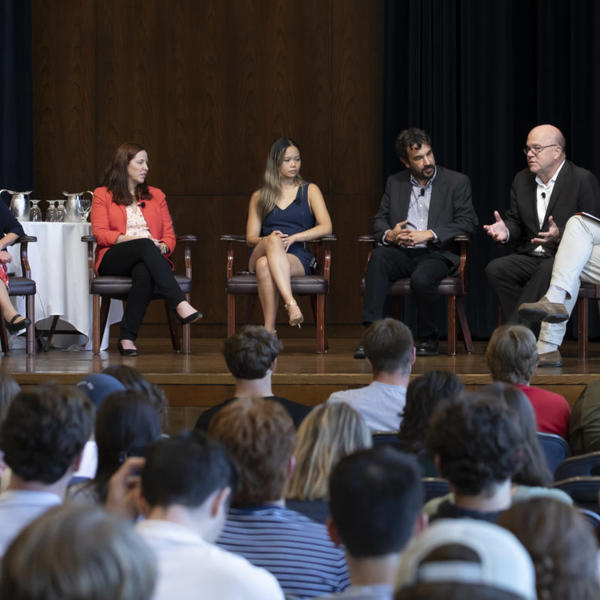Systemic hunger, which affects nearly 40 million Americans, can be ended, according to experts who gathered at the College of the Holy Cross for the “Building the Political Will and Moral Courage to End Hunger in America” forum on Tuesday.
While possible, it won’t be easy.
"These kinds of conversations are important because that's when the mission of this institution becomes real," said Chris Staysniak, co-coordinator of the event and Montserrat lecturer. "We talk about 'women and men for others' and what it means to confront complex pressing issues. To me, there is no other, or there are few issues I find as scandalous and enduring as hunger and food inequality in America."
Hundreds of students, faculty, staff and food-security advocates gathered in the Hogan Campus Center ballroom to listen to a panel that included U.S. Rep. Jim McGovern (D-MA), Erin McAleer '02, CEO and president of Project Bread, student Phoebe Wong ’26, Jean McMurray, executive director of the Worcester County Food Bank and Winton Pitcoff, director of the Massachusetts Food System Collaborative.
"There are nearly 40 million Americans who don't know where their next meal will come from… and it defies stereotypes," McGovern said. "I believe that food is a fundamental right. Hunger is a political condition. We have the resources; we have the food; we have the infrastructure; we have the knowledge … we lack the political will at every level and every sector to end this problem.”
Each panelist said that hunger is an economic issue – not an employment issue.
"If we could take all the resources that go into keeping feeding programs and food pantries open, channel all of that power into long-term systemic change needed to make real, sustainable solutions, we can end hunger. Charity and nonprofits cannot do this alone," McMurray said, adding that there is an essential role for government to invest in the people.
Wong, who spent a year working as a FoodCorps service member in Connecticut with East Hartford Public Schools during the 2021-2022 school year, said education is a key tool.
"Food education is so important to creating an understanding and a connection to the process that brought the food to your plate, how to eat healthier, and why it matters," she said. The day following the panel,Wong traveled to Washington, D.C. to join McGovern and others at the White House Conference on Hunger, Nutrition, and Health, an event held to bring attention to national food insecurity and diet-related disease.
Joshua Freitas '26 asked Wong how Holy Cross students can serve as nutrition educators and local food advocates within academia.
"We're the ones affected by this, and we have the opportunity to do the most we can to improve the situation for our generation and those younger than us," Freitas said. "We should know how nutrition can affect lives and why understanding it can help fix the problem of hunger."
Wong encouraged Freitas and other students to learn about the food system within the city of Worcester and on campus. Other panelists suggested advocating for changes that students consider unjust or increasing their understanding of how food touches everything, from business to education to social status.
Related Coverage:
- Telegram & Gazette, Sept. 27: 'Hunger is costing us in so many ways.' Panel talks hunger ahead of White House conference


